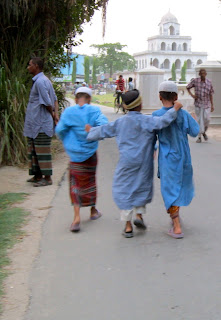This afternoon I was surprised by the sudden appearance of this pink hibiscus in my garden.
The flower-bed-lined balcony off the kitchen in my flat in South Khulshi is a sacred space. A sanctuary, especially at sunset and sunrise. I've done my best to keep the effect of my jet lag that allows me to fall soundly asleep by 9:30 or 10pm and be up by 5:30 or 6am, sipping coffee with my BCP on the balcony. I am exceedingly blessed to have this space and I'll be damned if I take it for granted.
That's why--when the green plants of my treasured green space began to wither and die last year--I hired a gardener for a day to doctor it up a bit. Tik koron, shundor koron. "Fix it, make it beautiful," was my simple plea, "Oh and rong lagbe, I need color!" With these simple directives the gardener disappeared out into Chittagong and returned hours later with pots of young green plants, good soil and a hose, and began operating on the parched beds. At the end of the day he assured me the colors would come. Flowers would come. Phul ashbe.
And they have. I went to the States for a month of the monsoons and I returned to plants twice the size of when I'd left. Every day a different plant blooms with a surprise blossom. Today it was the pink hibiscus.
This seems to happen on the streets of Chittagong too -- the sudden igniting of a tree that yesterday was green and today bursts with near-supernatural shades of red, orange, yellow, or fushia. Taking photos of the blossoms becomes addictive. A couple months ago I finally bought M.A. Taher's books, Bangladesher Phul and Bangladesher Pakhi, on the flowers and birds of Bangladesh. From the States I brought back a pair of binoculars--a Christmas present from my brothers--and I plan to try a hand at "birding" in the Chittagong hill tracts. For now, I'm using the flower book to identify my balcony surprises.
I came across this quote by Rabindranath Tagore on the first page of Bangladesher Phul.
"Phul bole, dhono ami matir pore."
Anyway, I'll update you if I get another translation.
Speaking of mud, while I was watering my pots (which I also sprinkle every morning with my used coffee grounds), I noticed the first sprouts of my sunflowers! The lovely Rebecca Clark sent me off from Maine to Bangladesh with sunflower seeds last summer (2011), and I failed my first growing attempt. That was also the year the whole garden died and the gardener was called in. My job kind of took over my life last year, and I'm committed to not letting that happen again. So I'm watering the sunflower seeds and doing my best to battle against the impetuous seed-eating ants.
I'm also growing basil and parsely -- first basil sprout below!
I could do a whole post devoted to the fragrances and odors of my life in Chittagong, and perhaps I will. A preview to that is the photo below, of the sweetest phul in my humble garden. I couldn't find the name for this one in my book, so I'll ask the gardener to enlighten me when he comes to advise me on the worsening ant crisis. Anyway, you can smell these tiny white blossoms from yards away and they'll take you to happy places in your mind.

I discovered from my book that the flowers below are called in Bangla, kathmaloti, or tagar, or officially, tabernamontana dichotoma of the apocynaceae variety.
And on the opposite side of my apartment, I look out my living room window at kash phul, or thatch grass. In the morning, a few cows and goats feed among these soft white heads of meadow grass that wave gently in the easterly breeze.
The scientific name for thatch grass is saccharum spontaneum, gramineae. The Latin is fantastic, isn't it? I'm sure one could find a way to live life by mottos based on floral nomenlature.
To end, I'll quote M.A. Taher's thoughts from his "Author's Words" in Bangladesher Phul:
Flowers may not be indispensable in our everyday life but we show our love for them in all our social functions. We welcome our guests and adorn the venue of our festive functions with colourful flowers. During Puja, flowers are essential. We show our love for our beloveds with a present of flowers. And the beauty of flowers satisfy our aesthetic urge. Again, the medicinal qualities of many flowers surprise us. But above everything else it is the beauty of flowers that gives us the greatest joy. Moved by the beauty of flowers poets have written poems, musicians have composed songs, artists have painted pictures. On the first of Falgun when spring arrives the sight of young women clad in yellow dress with garlands of beautiful flowers wound around the coil of their hair delights us.











